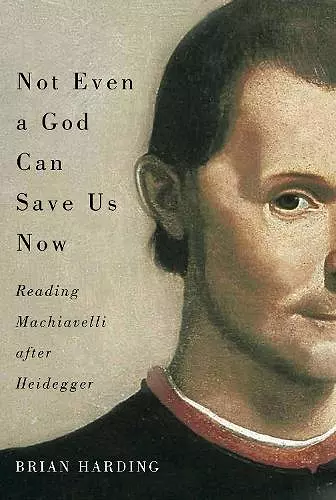Not Even a God Can Save Us Now
Reading Machiavelli after Heidegger
Format:Paperback
Publisher:McGill-Queen's University Press
Published:29th May '17
Currently unavailable, and unfortunately no date known when it will be back

The interplay between violence, religion, and politics is a central problem for societies and has attracted the attention of important philosophers, including Martin Heidegger, Jacques Derrida, and Rene Girard. Centuries earlier during the Italian Renaissance, these same problems drew the interest of Niccolo Machiavelli. In Not Even a God Can Save Us Now, Brian Harding argues that Machiavelli's work anticipates - and often illuminates - contemporary theories on the place of violence in our lives. While remaining cognizant of the historical and cultural context of Machiavelli's writings, Harding develops Machiavelli's accounts of sacrifice, truth, religion, and violence and places them in conversation with those of more contemporary thinkers. Including in-depth discussions of Machiavelli's works The Prince and Discourses on Livy, as well as his Florentine Histories, The Art of War, and other less widely discussed works, Harding interprets Machiavelli as endorsing sacrificial violence that founds or preserves a state, while censuring other forms of violence. This reading clarifies a number of obscure themes in Machiavelli's writings, and demonstrates how similar themes are at work in the thought of recent phenomenologists. The first book to approach both Machiavellian and contemporary continental thought in this way, Not Even a God Can Save Us Now is a highly original and provocative approach to both the history of philosophy and to contemporary debates about violence, religion, and politics.
" This book is a refreshing and bold attempt to rethink Machiavelli' s political philosophy in light of recent trends in continental philosophy of religion. Harding has a distinguished publication record in French phenomenology and now brings his critical attention to bear on a thinker who is frequently stereotyped and, occasionally, dismissed as simply a defender of sovereignty and political expediency." J. Aaron Simmons, Furman University " Those who study intellectual history, and those interested especially in the philosophy of religion, will find the book an interesting contribution to the dialogue. Harding brings disparate thinkers into conversation with one another with considerable skill." William B. Parsons, Carroll College
ISBN: 9780773550513
Dimensions: unknown
Weight: unknown
224 pages